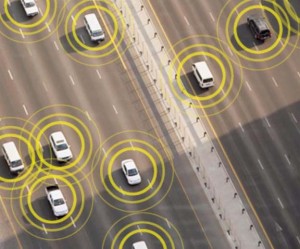The U.S. Department of Transportation and the University of Michigan Transportation Research Institute, or UMTRI, are getting ready to launch the largest experiment ever involving connected vehicles that use wireless signals to talk to one another in an effort to improve highway safety while also easing traffic.
The first-of-its-kind, large-scale experiment will test a Wi-Fi-like technology that allows vehicles and highway infrastructure to communicate with each other. According to the National Highway Traffic Safety Administration, such technology could help prevent as many as three out of every four highway deaths.
UMTRI will conduct the year-long project in Ann Arbor, Michigan where nearly 3,000 cars, trucks and buses equipped with vehicle-to-vehicle and vehicle-to-infrastructure communication devices will “talk” to each other and to highway infrastructure systems.
Scott Belcher, president of the Intelligent Transportation Society of America, said connected vehicles can help not only make motoring safer, it can also ease congestion. The technology has potential advantages for both passenger vehicle and heavy truck applications, according to Belcher, who just last week presented an award for innovation to suburban Detroit supplier MeritorWabco which has developed smart safety systems for commercial trucks.
The budgets for highway departments all over the country are under intense pressure, Belcher noted. Nonetheless, the new federal highway bill includes funding for research on connected vehicles and the infrastructure that can support them, he said.
Belcher added after years of leading the world in transportation innovation, the United States is falling steadily behind other countries in the developed and developing world, which means it is less competitive economically.
“The future is connected vehicle-to-vehicle communication,” he said.
Smart solutions require broad collaboration between industry, government and academia, he added.
Several automakers and supplier, including Meritor, Honda, Mercedes-Benz and Ford, as well as technology firms are actively working with connected vehicles. Indeed the connected vehicle technology has already made significant inroads in commercial trucking.
“Technology is changing the way they operate,” Belcher said since some fleet operators have deployed technology that can actually check to see whether a driver is alert enough to stay on the road.
Last year, U.S. roadway deaths fell to their lowest level since 1949, but that still meant more than 30,000 fatalities. Connected car systems could serve to reduce the number even further.
Meanwhile, traffic congestion continues to grow in major urban areas across the country. Proponents believe connected car technology will help squeeze more vehicles onto existing roads rather than require continued addition of more pavement.
A smaller test run by the NHTSA last year not only provided positive feedback about the potential benefits of connected car technology but also found the majority of participants saying they would like the systems in their own cars in the future.

